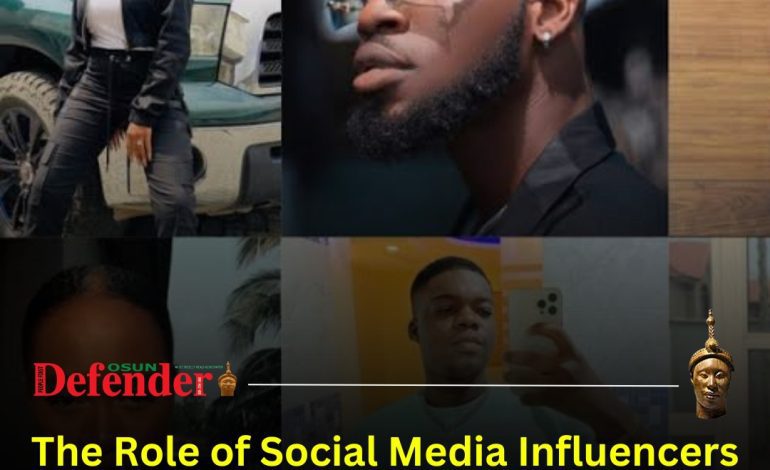The Role of Social Media Influencers in Shaping Nigerian Lifestyles

In the vibrant digital era, social media influencers have emerged as pivotal figures in shaping lifestyles, particularly in Nigeria, where platforms like Instagram, X, TikTok, and YouTube have become cultural hubs.
In this article, Osun Defender explores how these influencers, often revered for their creativity, authenticity, and ability to connect with diverse audiences, play a significant role in molding trends, behaviors, and societal values across the country.
Defining Social Media Influence
Social media influencers are individuals who leverage their online presence to engage and captivate audiences, often using their platforms to share personal experiences, professional expertise, and endorsements. In Nigeria, these influencers range from fashionistas and food enthusiasts to tech geeks and political commentators, each carving a niche that resonates with followers.
Influencing Fashion and Beauty Trends
Fashion and beauty are two industries significantly impacted by Nigerian influencers. Celebrities like Toke Makinwa and content creators such as Dimma Umeh have inspired millions with their styles and makeup tutorials. By showcasing local and international brands, these influencers not only boost sales but also highlight African creativity. For many young Nigerians, their Instagram feeds are virtual catalogs for wardrobe inspiration.
READ ALSO
•Harsh Economy: Woman Narrates How People Died Looking For Food In Abuja
•50 Happy Christmas Messages To Send To Your Loved Ones
Redefining Food and Culinary Experiences
Food bloggers and chefs, such as Sisi Yemmie and Zeelicious Foods, have introduced Nigerians to both traditional dishes and modern cuisines. Through mouthwatering recipes and restaurant reviews, they shape culinary tastes and encourage exploration of Nigerian flavors. The rise of food vlogging has also made home cooking more accessible to millennials and Gen Z.
Promoting Health and Fitness
In a country where health awareness is gradually increasing, fitness influencers are instrumental in promoting wellness. Figures like Kemen Fitness and Jane Mukami use their platforms to share workout routines, meal plans, and motivational content, inspiring Nigerians to embrace healthier lifestyles.
Driving Conversations On Social Issues
Beyond lifestyle trends, Nigerian influencers are catalysts for social change. Activists such as Aisha Yesufu have utilized their platforms to address pressing issues, from gender equality to governance. These influencers mobilize youths, amplify voices, and challenge societal norms, making social media a powerful tool for activism.
Challenges and Controversies
While influencers wield significant power, their impact is not without challenges. Issues such as fake lifestyles, misinformation, and unrealistic standards are growing concerns. Additionally, the monetization of influence through paid promotions sometimes raises questions about authenticity. However, these challenges are opportunities for influencers to prioritize integrity and accountability.
The Future of Influencing in Nigeria
As internet penetration deepens in Nigeria, the role of influencers is expected to grow even further. Collaborations with brands, governments, and non-profit organizations will likely expand, with influencers becoming key stakeholders in various industries. Moreover, the rise of micro-influencers—those with smaller but highly engaged audiences—indicates a shift towards more personalized and relatable content.
Conclusion
Social media influencers have revolutionized how Nigerians live, learn, and engage with the world. From setting trends in fashion and food to championing societal change, their impact is undeniable. However, as their influence grows, so does the responsibility to use it ethically and meaningfully. Nigerian influencers are not just trendsetters; they are architects of a modern lifestyle narrative, blending tradition and innovation in a uniquely African way.

Titilope Adako is a talented and intrepid journalist, dedicated to shedding light on the untold stories of Osun State and Nigeria. Through incisive reporting, she tackles a broad spectrum of topics, from politics and social justice to culture and entertainment, with a commitment to accuracy, empathy, and inspiring positive change.









